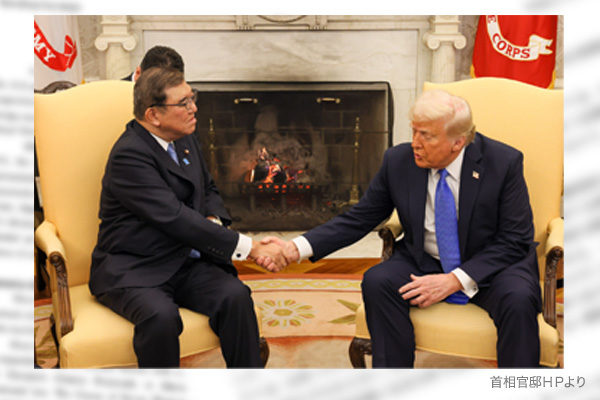The Japan-U.S. summit on February 7 was a success in terms of substance thanks to earlier low expectations placed on the meeting. In a surprise move, U.S. President Donald Trump described Nippon Steel’s stalled plan to acquire U.S. Steel as an “investment” rather than a “purchase,” suggesting that he might modify his earlier position of blocking the plan. Pleasing Trump was Prime Minister Shigeru Ishiba’s announcement that Japan’s investment in the United States would be raised to $1 trillion. However, how to proceed with the investment expansion as well as Nippon Steel’s acquisition plan remains to be seen. Given that the Trump administration is expected to impose high tariffs on Japan, the Ishiba-Trump talks could have been “the first and last honeymoon meeting” as described by a former senior Japanese government official.
Ishiba imitated Abe’s style
At the beginning of the meeting, Ishiba referred to the late former Prime Minister Shinzo Abe known for his establishment of a honeymoon relationship with Trump and said that he was very impressed by the word “peace” written in a book he received from Trump through Abe's wife, Akie, who met with Trump and his wife late last year.
In order to build a good relationship with Trump, Ishiba had no choice but to mention Abe who had been his bitter political adversary. Ishiba frequently flattered Trump at the meeting in a manner to imitate Abe’s style, although he might have conflicted feeling about following suit of his past rival.
In response, Trump said, “We will extend the full strength of American deterrence capabilities in defense of our friend and ally 100 percent.” The joint statement by Trump and Ishiba expressed “strong opposition to any attempts by the People’s Republic of China to change the status quo by force or coercion in the East China Sea.” It also included “support for Taiwan’s meaningful participation in international organizations.” A senior Japanese Defense Ministry official welcomed the joint statement as including what Japan wanted.
Free hand
Meanwhile, there was no mention of the war in Ukraine or Trump’s idea of U.S. ownership of the Gaza Strip. Japan thus avoided any commitment that could lead to new increase in its financial burdens and secured its free hand, said a senior Japanese government source. However, this means that it remains to be seen what kind of demands Trump may make to Japan in the future regarding those issues.
With regard to the planned relocation of the U.S. Marine Corps Air Station Futenma in Okinawa to Henoko, also in Okinawa, the statement confirmed “the vital importance of the steady implementation of the realignment of U.S. forces in Japan,” falling short of describing the relocation as the “only solution” to avoid the permanent use of the Futenma station, as seen in the 2021 joint leaders’ statement. It may be said that the new statement avoided a definitive tone at a time when the realignment of U.S. forces is uncertain.
As Ishiba’s is a minority government, it is uncertain whether he can deliver on his promises. Given that Trump dislikes weak leaders, the question is whether Ishiba can demonstrate his ability to get things done.
Takashi Arimoto is a Planning Committee member at the Japan Institute for National Fundamentals and a columnist at the Sankei Shimbun newspaper.


